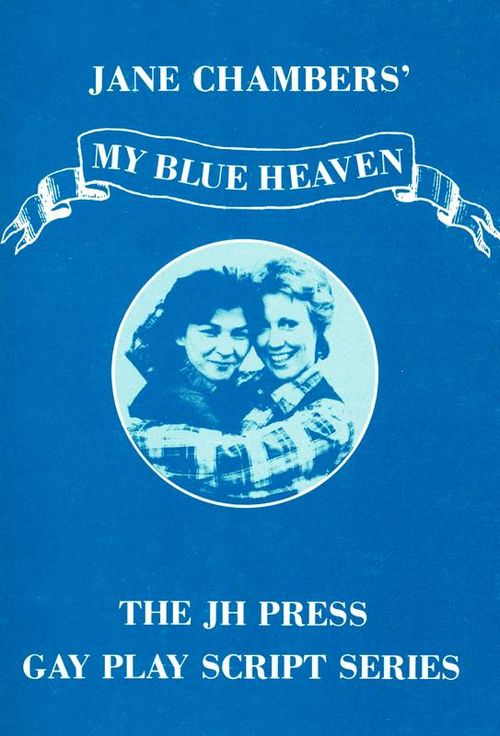My Blue Heaven: A Comedy In Two Acts
The JH Press Gay Play Script Series
Jane Chambers
Molly Sanford and Josie Williams–characters directly based on Chambers and her lover Beth Allen–have retreated from the oppressive environment of New York to make a go of country life. Molly, a writer, hopes the seclusion will help her write better; Josie has a hankering to open up a salvaged-goods store; and both of them anticipate that living together away from urban pressures will bring new intimacy to their somewhat stale relationship. Molly becomes a ‘homespun humor columnist’ for a regional farmers’ journal, using her experiences as a city gal trying to make it up country as the basis for her articles. In the column, Josie becomes Joe, Molly’s virile husband and the father of their make-believe child. ‘You’re a hypocrite,’ charges Josie. ‘No,’ parries Molly. ‘I’m a liar.’
Molly lies because she’s been burned before; her book on the joys of gay life led to her being fired from a teaching job. Farmhouse seclusion is her way of living as a lesbian without having to worry about other people’s opinions; the only heterosexuals Molly and Josie have to deal with are a few overactive goats and cats and Arnold, a particularly horny rooster. (‘Maybe you should tell him about birth control,’ says Molly. ‘I did,’ responds Josie. ‘He sees it as the hen’s responsibility.’)
No one like Molly, on whom Chambers bestowed her own passion to communicate, can function forever in such an out-of-the-way environment. Society must inevitably butt in, and it does, in the form of two men, both religious types. Mr. Miller, who pays a visit in act one, represents an ultraconservative Christian publishing company and wants to collect Molly’s columns in book form–as a testament to the strength of the traditional family. In act two, the gentleman caller is one Dr. John, an old school friend of Molly’s and a liberal minister. John, like Miller, wants to make an example of Molly–not as the stereotypical farm wife she pretends to be, but as the lesbian she is. He wants to conduct a wedding ceremony for Josie and Molly to make a statement in favor of gay and lesbian marriages–and reap publicity for himself in the bargain. (The resemblance to controversial New Jersey Episcopal bishop John Spong seems purely unintentional though prophetic.)
My Blue Heaven is structured less like a full-length play than like two back-to-back episodes of the same television series; and indeed its glib style, full of off-the-cuff wisecracks and slow double-takes, owes a clear debt to 1970s situation comedy. Chambers, who died of a brain tumor a few years after writing this work for a 1981 gay and lesbian arts festival in New York, was intrigued by how lesbian themes and characters would function in a mainstream entertainment style. Her Last Summer at Bluefish Cove, with which Foosteps made its debut a few seasons back, was pure soap opera except in its rejection of the standard equations that sex equals guilt and homosexuality equals more guilt; here, she wanted to offer homosexual audiences the same light-comic reinforcement that, say, the Mary Tyler Moore Show did for single straight women. If that goal seems less than compelling, keep in mind that when Chambers was writing, the few lesbian images that existed were almost always the offensive stereotypes promulgated by movies like, for instance, The Fox.
My Blue Heaven’s commitment is clearly to the gay and lesbian cause. But its reach can extend beyond its core audience because of the ingratiating good-naturedness of Chambers’s humor and the infectious affection she feels for her characters. Marlene Zuccaro’s staging at the intimate Footsteps space brings out the work’s best qualities, her light touch underplaying the potentially slick dialogue with a nicely laid-back geniality. Zuccaro is aided by an enormously likable three-person cast. Susan V. Booth is tender but tense as the conflicted Molly; Vita Dennis as Josie projects an air of take-charge assurance, simultaneously conveying the uncertainty of a woman who’s afraid her lover is drifting away from her. David Wagner is excellent as both the farcical fundamentalist and the earnest preacher, providing as well the voices of various animals from behind Becky Flory’s sickly green dump of a farmhouse set. ~ Albert Williams, Chicago Reader, of the play itself
Check for it on:
Details
| ISBN | 9780935672039 |
| Genre | Performing Arts |
| Publication Date | Jan-86 |
| Publisher | TNT Classics Inc |
| Format | Paperback |
| No. of Pages | 91 |
| Language | English |
| Rating | NotRated |
| Subject | Play |
| BookID | 8591 |
